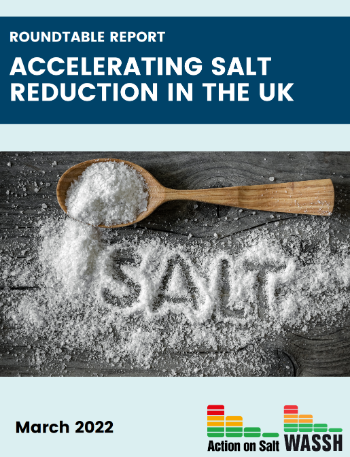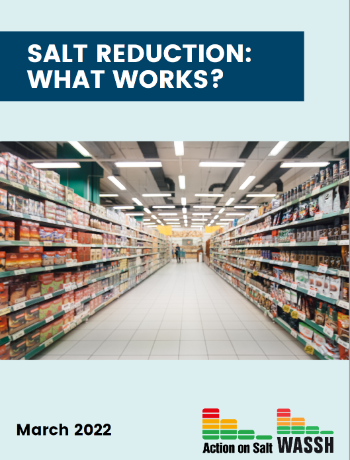Policy

Please click here to view the report: Roundtable Report 2022 [PDF 5,576KB]
During Salt Awareness Week 2022, Action on Salt and WASSH hosted a vritual roundtable with key stakeholders to discuss the UK’s salt reduction programme. The purpose of the roundtable was to create consensus that salt reduction progress is needed to prevent cardiovascular disease, responsible for one in four deaths in the UK, and identify how to accelerate progress. Participants discussed broad themes, drawing on their diverse experiences in public health and prevention to identify common ground on the need for salt reduction in the UK, and highlight barriers and opportunities to achieving progress in salt reduction.
Key reflections:
- Salt is a chemical additive and has trace calories, making it easier to reduce in food products than sugar and saturated fat
- The political focus in recent years has been on obesity prevention, and rightly so, but salt reduction is a key prevention initiative to reduce the risk of cardiovascular disease - the cause of one in four deaths in the UK
- The voluntary nature of the UK's salt reduction programme is an issue; all sectors of the food industry must be involved to ensure progress which could be achieved via mandatory targets
- The public must be mobilised to demand lower salt products, in order to influence the food indsutry and the government to take more action
- A wider range of stakeholders should be involved in the policy, including retail buyers and taste panel participants
- Salt reduction is a global issue and countries worldwide are taking action. We can learn from and build on their success

Please click here to view the report: Salt Reduction: What Works? [PDF 2,780KB]
To mark Salt Awareness Week 2022, Action on Salt and WASSH developed a policy resource highlighting ‘what works’ when it comes to salt reduction policies. Decades of very strong evidence tells us unequivocally that salt negatively impacts health. Robust salt reduction policies must be prioritised to prevent millions of needless deaths globally, and save billions in healthcare costs.
Results from a scoping review of real-world evidence has revealed several key elements, including:
- Bold and ambitious political leadership to implement and maintain salt reduction policies
- Mandatory salt reduction targets to create a level playing field
- Front of pack nutrition labels to incentivise reformulation
- Advocacy to aid the prioritisation of salt reduction on political agendas
- Consumer awareness campaigns to build support for salt reduction, but not to be relied on as a standalone tool for salt reduction
- Interventions in the out of home sector and fiscal measures on added salt products could ensure wider progress


